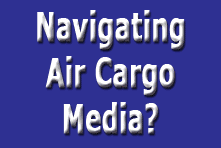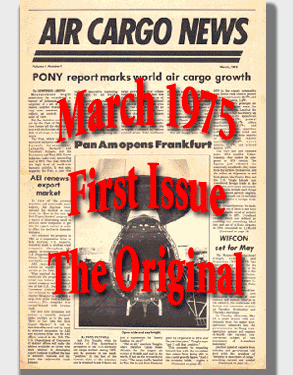
Somehow, Hiran Perera has kept his youthful
good looks and easygoing manner, even managing to appear amused and not
overwhelmed at the increased attention he has received lately as Emirates
SkyCargo Vice President Cargo, Freighters.
Maybe it’s the experience gained after
nearly 20 years aboard Emirates SkyCargo.
Or perhaps it’s something in the water
at home in his native Sri Lanka.
Whatever it is, as a key executive who has
been with Emirates SkyCargo since it began its meteoric rise into the
top 20 of world air cargo carriers (EK is now ranked in the top three),
Hiran combines textbook knowledge and on-the-job experience with an even-handed,
soft spoken style—no matter what whirlwind is sweeping through air
cargo at the moment.

But when it comes to operating freighters,
it is all good to Hiran.
"Freighter operations growing the business
of SkyCargo globally are a valued and increasingly important part of our
cargo operation.
“Everyone here from top to bottom
is a team player, determined to get the job done.
“The most important thing right now
is the high cost of fuel and what it may do to the overall economy and
the resultant impact it will have on airfreight.
“While one cannot do much about the
fuel prices, I believe trying to understand the impact is important to
formalize short- and medium-term strategies to get through the road bumps
(or air pockets).
“Of course, one must not lose sight
of long-term objectives either.
“But in the meantime, we remain quite
busy utilizing our entire fleet to our global destinations.
“Today people ask us: ‘don’t
you need a small capacity aircraft?’
“What I say is that you can easily
combine two small markets and service both with a B777F and have better
cost efficiencies than operating a sub-fleet.”

Currently Emirates operates all its passenger
and freighter schedules from DXB, although Hiran is readying to “migrate
our freighter operations to the new airport DWC this May.”
As to the challenge of operating the cargo
business at two gateways, Hiran says simply:
“We have always been up to managing
and benefitting from change, and all of us remain confident we can make
DWC not only work, but at the end of the day be instrumental in developing
SkyCargo further.
“We carry about 30 percent of total
cargo volume aboard our freighters.
But there is a certain interconnectivity
between the freighters and the passenger flights belly lift.
“Even though we will move all-cargo
to DWC, we will operate trucks that will be given high-speed access here
at DXB to connect with our belly fleet.
“In any case, today our freighters
are parked on the north side of DXB and to connect cargo across this busy
airport can take as much if not more time than moving between DXB and
DWC.
“It is all about how we choreograph
our airplanes and truck movements,” Hiran said.

We asked Hiran about the A380 and its role
in air cargo—would it ever be a freight-carrying airplane?
“It remains to be seen whether the
Airbus can offer service as a freighter, because that variant was scrapped.
Now things have changed; the A380 cargo
offering will have to be completely different, because today the B777
does the job.
“A380 is a great airplane.
“The cargo capability of the airplane
is much better than we expected it to be.
“We did a lot at the time with Airbus
in order to optimize the underbelly cargo capacity, and that’s paid
off.
“We had to push them to make some
design changes; for example, we specified the ability to carry pallets
in what we call the tunnel area, the area in between the gear.
“The original specs only allowed for
containers, and that volume is very beneficial when you have a full passenger
load; when these are operating on roads like Heathrow, Paris, or Incheon,
that freight capability is important.
“With that volume, we are now able
to achieve 13-15 tons and have even gone up to 18 tons depending on the
density of the freight.”
In terms of the evolutionary cycle of developing
more capacity as new airplanes come online, Hiran Perera admits that he
was involved in the early stages of the A380 development.
“We worked as a team quite a bit in
order to get that belly capacity.
“We are happy to see that it’s
actually benefitting us.
“As we go along, we’ll do that
with new aircraft that come in as well, working with manufacturers to
ensure that belly capacity.
“For an airline like us, the freight
in the belly is extremely important—you cannot understate the importance
of it.”

Looking ahead Hiran pointed out everyone would
be happier if the market were better:
“That is no secret,” Hiran said.
While the carrier continues to expand itself
in some respects out of a downturn, posting continuously positive figures
“having opened up several new markets,” Emirates most recently
is adhering to continuing its program of “creating new opportunities
with our services that in most cases discover and open up new business
links.”
“For example, before we opened up
Brazil non-stops from Dubai, you would be hard pressed to find goods from
South America in the Middle East.
“Now our part of the world has a constant
stream of goods from Brazil and also has expanded that traffic to include
perishables from Chile.
“One of our newer destinations, Algiers
has brought many interesting commodities to this part of the world, including
truffles.
“So we see our services opening more
than just city pair connections; in fact, we are an engine for developing
new markets and trade possibilities, including the expansion beyond Dubai
via our vast network worldwide.

“What is unique about the Emirates
organization is that it is a team, and we have a great team with great
leadership, and that has set us apart from everyone else.
“I don’t think you can replicate
what we do here.
“It’s the coming together of
these different individuals as a team, and it has evolved over the last
quarter century plus years into something that is extremely special.
“I want to address an aspect of our
business that may get less attention—air charters.
“As mentioned earlier our charter
business has been growing in importance.
“Emirates developed the charter business
over the years. It doesn’t run separately; it runs within the freighter
unit.
“We’ve found that it has proven
to be absolutely invaluable to do that—it brings in a different
stream and you can manage the cyclical nature of our business and take
advantage of it.
“Our unique global position helps
as well, as we can take advantage of opportunities around us,” Hiran
Perera said.
Geoffrey/Flossie
|







